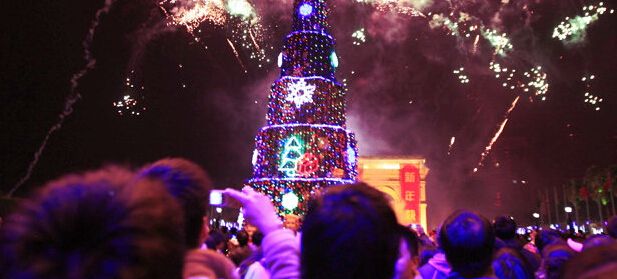It will only take [est_time] to read this post!
Christmas in China
This time of year often makes me realize what an amazing city I live in. Shenzhen, China might already be wearing her LBD (Little Black Dress) but she’s accessorized with some bling-bling! Shops, hotels and restaurants have all donned their best boas, rings and festive dangly-things and are looking pretty spectacular this holiday season 假期 (jià qī)!
However, being away from home at Christmas time has always been a bit of an emotional time for me, even though I’ve always had wonderful friends and colleagues around me. In my past English-teacher-life I was distracted by Christmas songs 圣诞歌 (shèng dàn gē), Santa hats 圣诞老人的帽子 (shèng dàn lǎo rén de mào zi) and performances 演出 (yǎn chū) and then I’d watch Raymond Briggs’ The Snowman (雪人 (xuě rén) for the tenth time and become an emotional wreck.
Celebrating Christmas in China as a Foreigner
Even though for the majority of the Chinese population, Christmas is just another day on the calendar, China has in some way started to embrace some elements of Christmas. Or at least, are making it easier for waiyguoren living in bigger cities to celebrate with good grub, fizzy wine and a good serving of Christmas pudding. Most hotels and restaurants provide a Christmas dinner for those who don’t want to deal with the mammoth task of cooking a turkey and trimmings. Most supermarkets sell Christmas decorations and it’s now possible to get real Christmas trees (delivered to your door, obviously!).
Although there isn’t an official holiday for Christmas in China, schools and companies with foreign staff tend to have parties to celebrate on Christmas Eve or Christmas day.
Christmas in the Office
In my first year at Written Chinese and my first year working in an office environment, it wasn’t the usual (as sitcoms have let me to believe) eggnog and snogging in the stock cupboard, we got ourselves into the Christmas spirit 圣诞节精神 (shèng dàn jié jīng shen) in other ways.
So, The Written Chinese Team decided to have a Secret Santa (神秘的圣诞老人 – shén mì de Shèng dàn Lǎo rén). Now I’m sure most of you have heard or even taken part in a Secret Santa, but some of our developers were, at first, a little reluctant to get involved! it’s hardly surprising though, I feel as though foreigners 外国人 (wài guó rén) once you take them out of their natural habitat so to speak, seem to be overly excited about every holiday or event, like you have to emphasise the point – ‘Hey, everyone. I know you don’t celebrate Christmas but because we’re so ridiculously excited about doing anything related to holidays we’re going to decorate your office and make you do a gift 礼物 (lǐ wù) swapping activity – enjoy!’
So before I tell you about our Secret Santa adventures, I wanted to find out a little more about what Chinese people think about Christmas. Actually, I was shopping in a famously branded jewelry store and there was so many Chinese men and couples buying 圣诞节礼物 (shèng dàn jié lǐ wù) Christmas gifts), I could barely get served. I wondered who they were buying for. Perhaps it’s the case that like many western holidays such as Valentine’s Day and Easter, China also wants to jump on the ‘season of good tidings’ bandwagon and get in on the action. Perhaps the reality is, Christmas is no longer about religion, or even tradition (传统 (chuán tǒng), but the opportunity for companies to make a mint…
What Chinese people think about Christmas
So I asked one of my Chinese colleagues, Chamcen, who I might add, is sporting Santa and reindeer 驯鹿 (xùn lù) nail art, what she thought about Christmas:
“In recent years, Christmas has become popular (流行 (liú xíng) among Chinese young people, because it’s considered a romantic, modern and fashionable 时尚 (shí shàng) festival. As there isn’t a holiday for Christmas, Christmas for Chinese people is just Christmas Eve 平安夜 (píng ān yè). Most Chinese people understand Christmas to be about Christmas trees 圣诞树 (shèng dàn shù), Father Christmas, gifts, revelry 狂欢派对 (kuáng huān pài duì) and another type of Valentine’s Day (China has at least 4 ‘valentine’s day type celebrations per year!). When I was a kid, and watched TV about Christmas in Western countries, I really wanted to know how Father Christmas comes in if there’s no chimney?! How he can find my stocking (圣诞袜 (shèng dàn wà)?”
– Chamcen Liu – Assistant Project Manager and Generally Awesome Elf
Chamcen also told me that in China, on Christmas Eve, Chinese people eat apples and often give apples as gifts. You may have noticed that the Chinese for Christmas Eve is 平安夜 (píng ān yè). The 平 (píng) is similar to the 苹 (píng) in 苹果 (píng guǒ – apple), but literally translated 平安 means safety and 夜 means evening.
Secret Santa in the Written Chinese Office
So on Christmas Eve at 6pm, sparked by Chamcen’s enthusiasm, we all crowded around our tiny bamboo Christmas tree to open our gifts.
There were candies and cosmetics, games, gadgets and a goat…spirits were high and gifts were given with thought and care. Parcels were ripped open with the excitement of a 5-year-old hoping for a Ninja Turtle doll (yes, they are cool again).
We all wished each other a Merry Christmas and some of us went home to be with our families (or surrogates in my case) some of us stayed and played with the coolest toy…
Who would have known we were away from our homes and celebrating Christmas in China…
On 26th December, Boxing Day 节礼日 (jié lǐ rì) in my neck of the woods (UK), it’s a day to eat leftovers (check), wear a Christmas sweater (check), and be grateful for having had another wonderful Christmas (double-check).
If you have any personal experiences of what it’s like spending Christmas in China, share them with us below!
